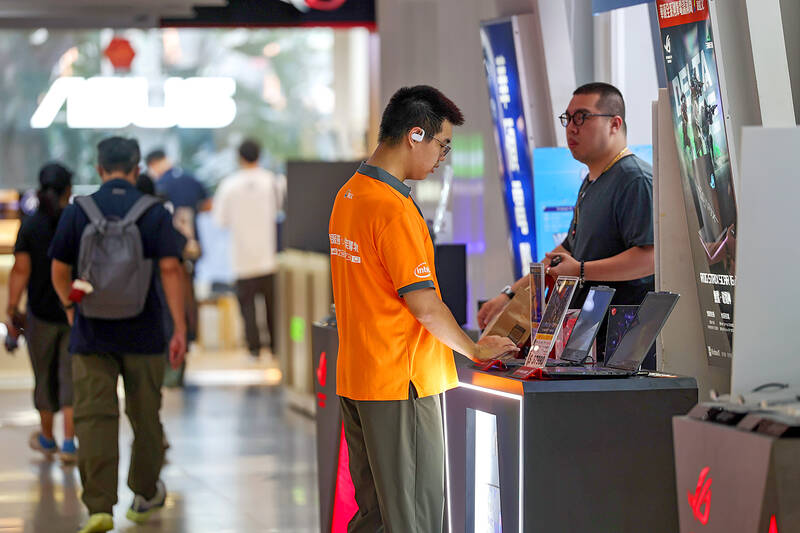Business confidence in Taiwan’s manufacturing, services and construction sectors improved last month, aided by easing concerns over US tariff policies and a weaker New Taiwan dollar, the Taiwan Institute of Economic Research (TIER) said yesterday.
The sentiment gauge for manufacturers rose 1.79 points to 88.88, increasing for a second consecutive month, while sentiment in the services sector climbed 1.01 points to 88.64, TIER said, citing a monthly survey.
The construction sector index advanced 2.66 points to 97.41, the Taipei-based think tank said.

Photo: CNA
“The latest data suggest broad-based resilience despite lingering external uncertainties,” TIER president Chang Chien-yi (張建一) told a news conference in Taipei. “Taiwan’s GDP growth could approach 5 percent this year with support from the government’s planned NT$10,000 [US$328.54] cash handout.”
The confidence improvement followed Washington’s decision on Aug. 7 to impose a 20 percent tariff on Taiwanese goods, while granting exemptions to companies with US investments, particularly in the artificial intelligence (AI) supply chain, Chang said.
The NT dollar’s depreciation against the greenback also helped ease trade-related pressure, he said.
Electronics and machinery firms reported improved sentiment on the back of robust demand for AI and high-performance computing, Chang said, calling the demand much stronger than expected.
However, Chang, who is a member of the central bank’s board, warned that gains from AI-driven growth are uneven.
Traditional industries remain under pressure from US tariffs, weak European demand and China’s anti-dumping measures, he said.
The steel industry turned less pessimistic, benefiting from production cuts and market support in China that drove up global steel prices, the survey showed.
In the services sector, retailers and hospitality businesses were more upbeat thanks to the summer holiday season and festival-related consumption, it showed.
Securities houses also gained confidence as higher trading volumes and stock prices lifted earnings from brokerage, proprietary trading and underwriting, it showed.
Construction sentiment also improved, even as adverse weather and reconstruction work delayed some public projects, TIER said.
Developers gained from the handover of previously postponed projects, which supported sales momentum, it said.
Public infrastructure spending, as well as AI-related factory and equipment investments would continue to underpin the sector, it said.
By contrast, the property market showed further signs of cooling, as tighter mortgage lending by banks dampened housing transactions, and prompted developers and buyers to delay new-home deliveries, it said.
While the Financial Supervisory Commission exempted first-home mortgages from loan restrictions, the central bank’s credit controls remain in place and lenders are cautious in granting new loans, it said.
With fresh supply due to enter the market, property sale volumes are expected to remain subdued and prices would trend downward in the short term, TIER added.

In Italy’s storied gold-making hubs, jewelers are reworking their designs to trim gold content as they race to blunt the effect of record prices and appeal to shoppers watching their budgets. Gold prices hit a record high on Thursday, surging near US$5,600 an ounce, more than double a year ago as geopolitical concerns and jitters over trade pushed investors toward the safe-haven asset. The rally is putting undue pressure on small artisans as they face mounting demands from customers, including international brands, to produce cheaper items, from signature pieces to wedding rings, according to interviews with four independent jewelers in Italy’s main

Japanese Prime Minister Sanae Takaichi has talked up the benefits of a weaker yen in a campaign speech, adopting a tone at odds with her finance ministry, which has refused to rule out any options to counter excessive foreign exchange volatility. Takaichi later softened her stance, saying she did not have a preference for the yen’s direction. “People say the weak yen is bad right now, but for export industries, it’s a major opportunity,” Takaichi said on Saturday at a rally for Liberal Democratic Party candidate Daishiro Yamagiwa in Kanagawa Prefecture ahead of a snap election on Sunday. “Whether it’s selling food or

CONCERNS: Tech companies investing in AI businesses that purchase their products have raised questions among investors that they are artificially propping up demand Nvidia Corp chief executive officer Jensen Huang (黃仁勳) on Saturday said that the company would be participating in OpenAI’s latest funding round, describing it as potentially “the largest investment we’ve ever made.” “We will invest a great deal of money,” Huang told reporters while visiting Taipei. “I believe in OpenAI. The work that they do is incredible. They’re one of the most consequential companies of our time.” Huang did not say exactly how much Nvidia might contribute, but described the investment as “huge.” “Let Sam announce how much he’s going to raise — it’s for him to decide,” Huang said, referring to OpenAI

The global server market is expected to grow 12.8 percent annually this year, with artificial intelligence (AI) servers projected to account for 16.5 percent, driven by continued investment in AI infrastructure by major cloud service providers (CSPs), market researcher TrendForce Corp (集邦科技) said yesterday. Global AI server shipments this year are expected to increase 28 percent year-on-year to more than 2.7 million units, driven by sustained demand from CSPs and government sovereign cloud projects, TrendForce analyst Frank Kung (龔明德) told the Taipei Times. Demand for GPU-based AI servers, including Nvidia Corp’s GB and Vera Rubin rack systems, is expected to remain high,